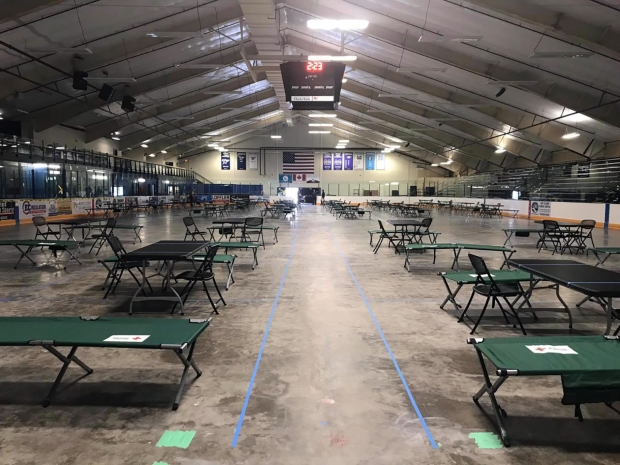Homeless Shelters Stretched Thin During Extreme Cold
Shelters need more funding for staff and space to safely house people during a pandemic.

Sojourner House of Eau Claire, which is operated by Catholic Charities of La Crosse, has opened an additional shelter to ensure social distancing for Eau Claire’s homeless population during the coronavirus pandemic. Photo courtesy of Sojourner House of Eau Claire
As temperatures remain frigid across much of Wisconsin, homeless shelters and warming centers in the state are feeling the added strain of housing people during the pandemic.
Joe Volk, executive director of the Wisconsin Coalition Against Homelessness, said most shelters have had to reduce the number of beds heading into this winter in order to maintain social distancing.
He said the extreme temperatures also make it more difficult for organizations to do outreach and check in on people living in vehicles or outdoors.
Even with the cold, Volk said some people experiencing homelessness are afraid to stay at shelters because of the coronavirus.
“They don’t want to get sick, much like the general public doesn’t want to go to a hospital or urgent care center (during the pandemic),” Volk said. “You can imagine a homeless person trying to make a decision, even in the cold, whether to stay outside or go into a shelter.”
Roberto Partarrieu is the executive director of Catholic Charities of the Diocese of La Crosse, which operates shelters in La Crosse, Eau Claire and Wausau.
He said they’ve been working with local governments and other charitable organizations to keep their shelters running during the pandemic.
“We had to move about three times in each location to find a larger space and more comfortable space so we can keep our guests with social distancing,” Partarrieu said.
In La Crosse, funding from the county government has helped Catholic Charities and the Salvation Army rent rooms in a hotel in order to isolate people who test positive for the coronavirus.
Partarrieu said his organization is currently able to shelter around 95 people in Eau Claire after they converted an old grocery store into a shelter. He said they’ve also moved operations in Wausau to a local church basement.
Partarrieu said they have been testing people for the virus when they come to a shelter to try to prevent outbreaks.
But even with added precautions, he said they have seen spread at their La Crosse and Eau Claire shelters. He also said isolating people who are positive or who have been exposed comes with an added cost.
“We have doubled the cost of all of our operations,” Partarrieu said. “We had to hire people, and we are now serving the individuals 24/7.”
He said the extreme cold temperatures across much of the state in recent weeks have further complicated operations, with all guests staying at the shelters around the clock.
To try to reduce the number of people at shelters this winter, Partarrieu said his organization helped to place more than 100 people in permanent housing last year, almost three times the number of people they’ve served in previous years.
“What has happened, I think, is that everybody is more aware of the need of helping the homeless and helping the poor. Because many of these individuals are simply on the street because of lack of economics. They go into unemployment or they lose their jobs,” Partarrieu said. “We are all more aware of their needs, so everybody’s contributing.”
But he said the number of people Catholic Charities have served at their shelters this winter has remained around the same as previous years.
Michael Basford, director of the Wisconsin Interagency Council on Homelessness, said funding is by far the number one need for organizations operating shelters this winter. He said state and local funding has helped offset some costs, as well as federal funding from the coronavirus aid bill.
“A lot of communities have been able to respond quite well with this,” Basford said. “Also, we now have new guidance from (the Federal Emergency Management Agency), with the new federal administration, that will provide more resources for communities to provide non-congregate sheltering.”
He said FEMA had been reimbursing communities for 75 percent of the cost to house people in motel rooms during the pandemic. But the new guidance from the Biden administration means the agency will now be reimbursing 100 percent of cost.
Listen to the WPR report here.
Frigid Temperatures Add To The Strain On Wisconsin Homeless Shelters was originally published by Wisconsin Public Radio.
More about the Coronavirus Pandemic
- Governors Tony Evers, JB Pritzker, Tim Walz, and Gretchen Whitmer Issue a Joint Statement Concerning Reports that Donald Trump Gave Russian Dictator Putin American COVID-19 Supplies - Gov. Tony Evers - Oct 11th, 2024
- MHD Release: Milwaukee Health Department Launches COVID-19 Wastewater Testing Dashboard - City of Milwaukee Health Department - Jan 23rd, 2024
- Milwaukee County Announces New Policies Related to COVID-19 Pandemic - David Crowley - May 9th, 2023
- DHS Details End of Emergency COVID-19 Response - Wisconsin Department of Health Services - Apr 26th, 2023
- Milwaukee Health Department Announces Upcoming Changes to COVID-19 Services - City of Milwaukee Health Department - Mar 17th, 2023
- Fitzgerald Applauds Passage of COVID-19 Origin Act - U.S. Rep. Scott Fitzgerald - Mar 10th, 2023
- DHS Expands Free COVID-19 Testing Program - Wisconsin Department of Health Services - Feb 10th, 2023
- MKE County: COVID-19 Hospitalizations Rising - Graham Kilmer - Jan 16th, 2023
- Not Enough Getting Bivalent Booster Shots, State Health Officials Warn - Gaby Vinick - Dec 26th, 2022
- Nearly All Wisconsinites Age 6 Months and Older Now Eligible for Updated COVID-19 Vaccine - Wisconsin Department of Health Services - Dec 15th, 2022
Read more about Coronavirus Pandemic here





















